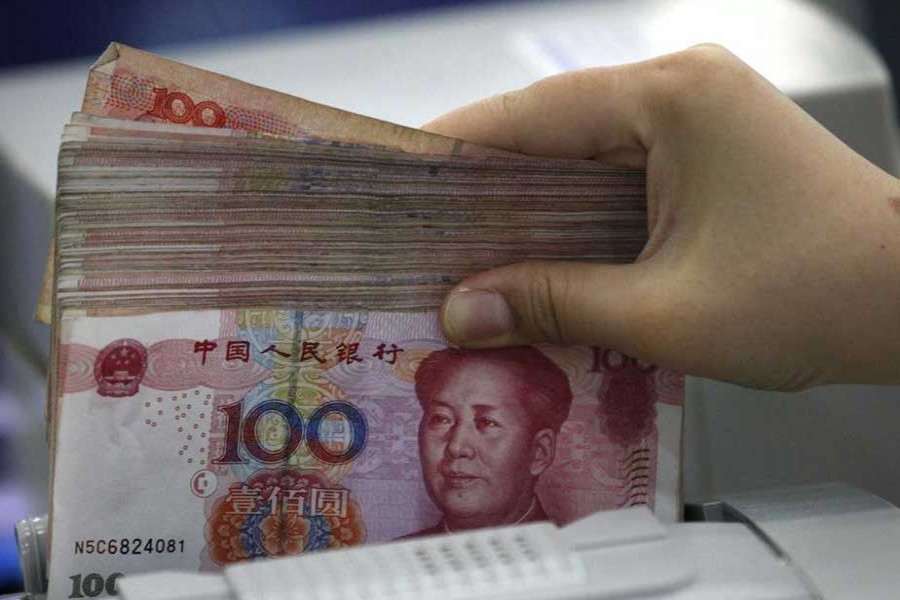
Published :
Updated :

Bangladesh Bank has finally permitted the commercial banks to open foreign currency clearance accounts in Yuan, the Chinese currency. The permission was long overdue. Yuan won a slot in the Special Drawing Rights or SDRs, the basket of reserve currencies of the International Monetary Fund (IMF), two years back. Since then Yuan is an internationally recognised reserve currency alongside the US$, British Pound, European Euro, Japanese Yen.
Bangladesh Bank should not have taken such a long time to allow opening of clearing accounts in Yuan. The decision should have come soon after the IMF included Yuan in the SDRs.
For many years the US $ was the dominant reserve currency in international transactions. Its position came under threat only with the introduction of Euro by the European Union in late 90's, but still US$ holds the 1st place in the settlement of international transactions. Perhaps, the position of US$ as the settlement currency will remain at the top for quite a long time. Many, however, think that its dominance will be squeezed out over time.
There is a speculation that China would overtake US in a few years in terms of the size of the economy, but many doubt whether Yuan will achieve number one position even with the emergence of Chinese economy as the number one on the world stage anytime soon. Yuan may take long to earn the kind of confidence the users have in US$.
The value of a currency is not only determined by its purchasing power, but also by the confidence of its users. Internationally, the US$ will have more users than Chinese Yuan for many years to come. Those who have the freedom of use like the individual international investors, will prefer US$ over Yuan or other reserve currencies for the very fact that they have more confidence in US$ than on other competing reserve currencies. In bilateral transactions among the nations, Yuan will see increasing use with increasing dominance of the Chinese economy on the world stage.
At the moment, Euro is in number two position, being used for up to 30 per cent of international transactions. But for Bangladesh, Yuan is more important than some other reserve currencies. China is the number one investing country in Bangladesh, and also its number one trading partner. So, when China wants that transactions with it be done and settled in Yuan, Bangladesh has rightly agreed to the proposal. How much Yuan, US$ or other reserve currencies Bangladesh Bank will hold in its portfolios foreign exchanges is absolutely its own decision. Bangladesh Bank's portfolio management with foreign exchanges depends on its own perception and on the availability of the respective currency as well as its confidence over a certain currency.
In terms of confidence at this moment, the US $ is reigning high with the international users. Monetary policies of the reserve currency-issuing countries and other relevant factors matter in making a decision regarding whether a reserve currency will go well with the international users or not. The users of reserve currencies will switch from one currency to another if they see one of these is losing value.
US central bank, the FED recently raised its policy interest rates, making greenbacks (the other name of US $) more costly to the users. This policy is pushing up the value of the greenbank internationally. Almost all currencies, big or small, lost values against this currency in the last few months, and Bangladesh currency Taka also did so. Bangladesh Bank policymakers need to see the movement of currency values very carefully, so that they can realign BB's foreign currency holdings or include other foreign assets in its portfolios accordingly. But we think a diversified holding of foreign assets will be the right kind of choice for Bangladesh.
The rise and increasing use of Yuan in international transactions is an opportunity for Bangladesh and also for other emerging economies. Many emerging economies like Iran are having bad relation with the USA and they would prefer to hold and do transactions in other currencies, including Yuan, for the simple reason of that they would not have enough supply of the US$.
Abu Ahmed is Professor of Economics, University of Dhaka.


 For all latest news, follow The Financial Express Google News channel.
For all latest news, follow The Financial Express Google News channel.